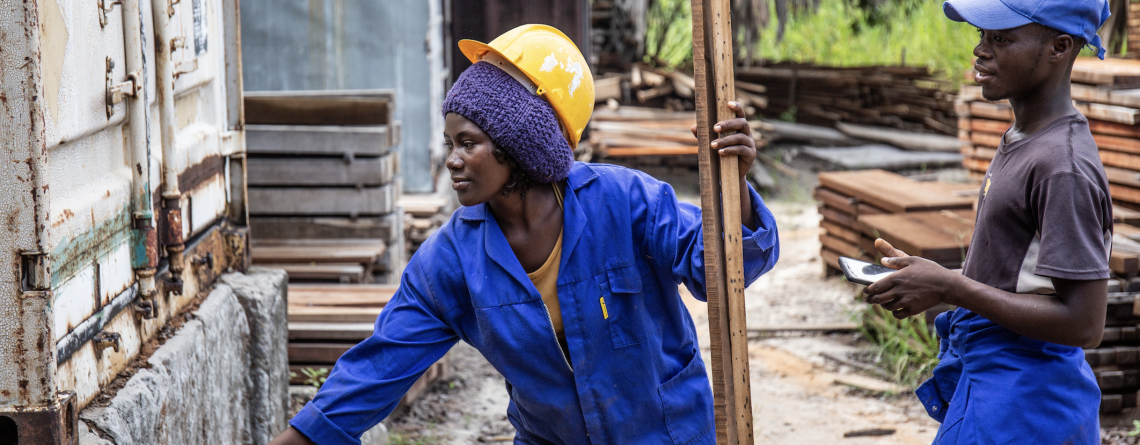Treevive and LevasFlor have formed a collaborative partnership to develop the carbon element of the Miombo500 project. This is aimed at advancing sustainable forest management, community development, research, and the sale of carbon credits in the magnificent Miombo forests of Mozambique. Encompassing a staggering 2.7 million km2 (270 million hectares) across ten countries in Southern Africa, the Miombo Woodlands represent the second largest forest ecosystem globally. Within this overwhelming expanse exist an estimated 8,500 species of higher plants, with over 54% of them being unique to the region. Given its ecological significance, the protection of the Miombo Woodlands is of supreme importance, and LevasFlor is working towards this cause. To gain deeper insights into LevasFlor’s initiatives, we had the privilege of speaking with David Östby, shareholder of LevasFlor and a key representative involved in the project Miombo500.
Levasflor is a Swedish owned, Mozambican Forestry Company with a 16-year history operating in the Sofala province with a forest concession of 46 000 hectares of Miombo woodlands. At the heart of LevasFlor’s operations lies the commitment to managing forests sustainably. By following Forest Stewardship Council (FSC) certification standards, the company ensures that its forestry practices prioritize the preservation of the ecosystem and the well-being of local communities. David emphasises LevasFlor’s collaboration with local communities in the region:
“By providing employment opportunities to over 200 individuals, the company has created a positive impact on the livelihoods of more than 1,000 people. This approach helps to improve the pressures of poverty-driven deforestation in the region. Through training programs and education, LevasFlor empowers community members to protect the forest, prevent fires, and contribute to sustainable regeneration efforts. The focus on human development and healthcare further ensures that communities have long-term opportunities to thrive, reducing the need for unsustainable activities”.
Their commitment to environmental stewardship extends beyond sustainable forest management. The company collaborates with a neighbouring national park to create safe habitats for wildlife. While challenges exist, such as potential conflicts with elephants damaging the forest, LevasFlor’s dedicated rangers work diligently to protect the ecosystem from illegal hunting and ensure the preservation of floral and insect species. As a result, the company has witnessed an increase in biodiversity within its concession area the last years.
The Miombo500 project
One of LevasFlor’s ambitions is the Miombo500 project, launched in 2023 intended to protect and develop 500.000 hectares of Miombo forests. The project applies a multi-stakeholder approach, where investors, communities, government and other actors are integrated. This project combines environmental sustainability, economic growth, and social progress. It provides a model for responsible forest management that other countries and companies can follow. The project has 3 important components: A business that seeks to optimize the local timber value chain, a non-profit foundation focused on community development, and a research center aimed at increasing technical, processing, and commercial knowledge on the lesser-known Miombo tree species. When fully invested, the project will employ 1000-2000 people and secure sustainable livelihoods for another between 10.000 and 20.000 people from local communities.
The project and its activities will secure that:
- Deforestation is minimized and forest restoration is enhanced, thereby maximizing carbon capture and storage
- Biodiversity is preserved and protected
- Value-add is taking place within the local area and is created through local employment
David underscores the collaboration’s long-term vision and the importance of providing the right incentives for all stakeholders involved.
“Our approach focuses on creating lasting, meaningful impact for both communities and the environment. We firmly believe in building sustainable businesses and fostering collaborations. It is crucial to involve the private sector and provide commercial incentives. By doing so, we can make a tangible and enduring difference in ecology, carbon capture, and community development in the region.”
By implementing the three pillars of the Miombo500 Project, LevasFlor aims to establish a sustainable and comprehensive approach to forestry management. Despite the challenges posed by government regulations and the complexities of the industry.
The collaboration between LevasFlor and Treevive on the sale of carbon credits for this project represents a progressive approach to sustainable forestry, community development, and biodiversity conservation. By combining commercial operations, community-focused initiatives, and scientific research, this partnership serves as a model for long-term ecological and economic success. With a shared commitment to preserving the environment and improving livelihoods, Treevive and LevasFlor are composed to make a lasting impact in the Mozambican forests and the livelihoods in the communities. As David underlines:
“Poverty-driven deforestation accounts for approximately 60-70% of the problem in this area. People resort to slash and burn practices for crop cultivation or rely on forest resources such as firewood and charcoal. We firmly believe that offering alternative employment opportunities is the key solution. By employing as many people as possible and providing better incomes, we can have a positive impact on livelihoods. Our aim is to create a scenario where communities work with us, earning salaries. This transformative shift promotes enhanced livelihoods by acknowledging the significance of sustainable forest management for both work and income, benefiting families connected to the forest and our company with aligned incentives”.


